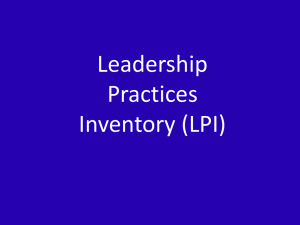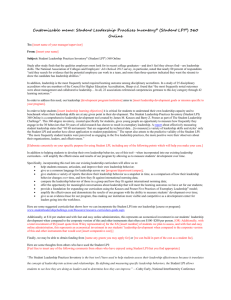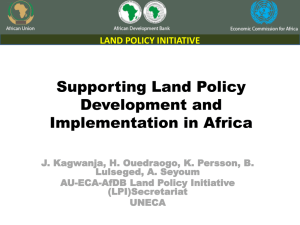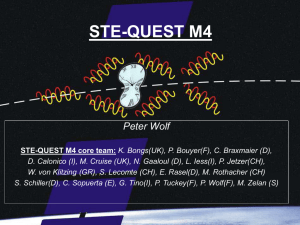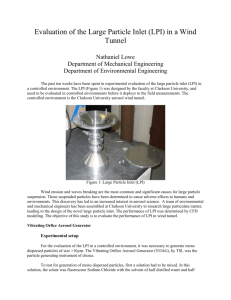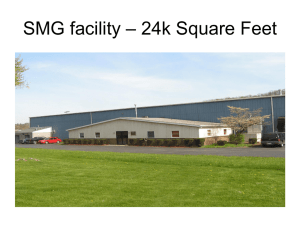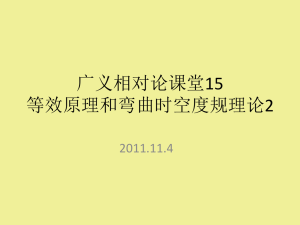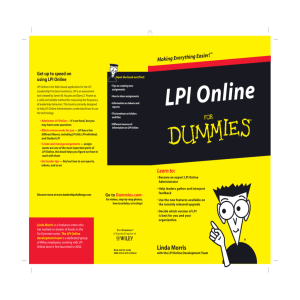LPI_institutional M-and-E Framework
advertisement
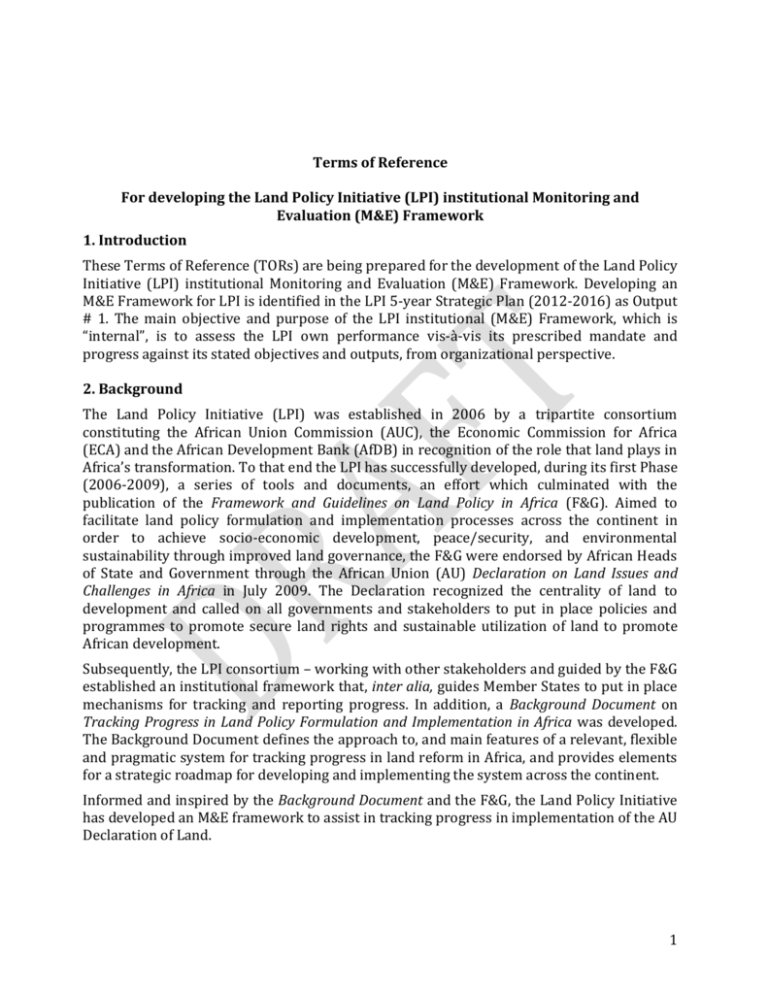
Terms of Reference For developing the Land Policy Initiative (LPI) institutional Monitoring and Evaluation (M&E) Framework 1. Introduction These Terms of Reference (TORs) are being prepared for the development of the Land Policy Initiative (LPI) institutional Monitoring and Evaluation (M&E) Framework. Developing an M&E Framework for LPI is identified in the LPI 5-year Strategic Plan (2012-2016) as Output # 1. The main objective and purpose of the LPI institutional (M&E) Framework, which is “internal”, is to assess the LPI own performance vis-à-vis its prescribed mandate and progress against its stated objectives and outputs, from organizational perspective. 2. Background The Land Policy Initiative (LPI) was established in 2006 by a tripartite consortium constituting the African Union Commission (AUC), the Economic Commission for Africa (ECA) and the African Development Bank (AfDB) in recognition of the role that land plays in Africa’s transformation. To that end the LPI has successfully developed, during its first Phase (2006-2009), a series of tools and documents, an effort which culminated with the publication of the Framework and Guidelines on Land Policy in Africa (F&G). Aimed to facilitate land policy formulation and implementation processes across the continent in order to achieve socio-economic development, peace/security, and environmental sustainability through improved land governance, the F&G were endorsed by African Heads of State and Government through the African Union (AU) Declaration on Land Issues and Challenges in Africa in July 2009. The Declaration recognized the centrality of land to development and called on all governments and stakeholders to put in place policies and programmes to promote secure land rights and sustainable utilization of land to promote African development. Subsequently, the LPI consortium – working with other stakeholders and guided by the F&G established an institutional framework that, inter alia, guides Member States to put in place mechanisms for tracking and reporting progress. In addition, a Background Document on Tracking Progress in Land Policy Formulation and Implementation in Africa was developed. The Background Document defines the approach to, and main features of a relevant, flexible and pragmatic system for tracking progress in land reform in Africa, and provides elements for a strategic roadmap for developing and implementing the system across the continent. Informed and inspired by the Background Document and the F&G, the Land Policy Initiative has developed an M&E framework to assist in tracking progress in implementation of the AU Declaration of Land. 1 The AU Declaration on Land requested the LPI Consortium (AU-ECA-AfDB) among others, to conduct studies on the establishment of an appropriate institutional framework that can support Member States in their efforts towards reviewing, developing and implementing land policies including mechanisms for progress tracking and reporting. More specifically, the AU Assembly requested the AU Commission, in collaboration with the Regional Economic Communities (RECs), ECA, the AfDB and other partners, to undertake measures for the establishment of mechanisms for progress tracking and periodic reporting by Member States on progress achieved. As a result, The LPI has made of the development and implementation of a monitoring and evaluation framework (MEF) a priority in the current Phase (II) of its activities, identified as Objective Nº 8 in the LPI Five-year Strategic Plan (2012-2016), and Output Nº 6 of its draft Business Plan for the Proposed Land Policy Centre (2013), and the LPI 2014 Work plan as well. Whereas the “external” LPI M&E Framework is aimed to track progress of the AU Member States in land policy formulation and implementation and report back to the AU Summit as requested by the AU Declaration on Land, the LPI Institutional M&E Framework is inwardlooking and is aimed to provide an internal view and framework for assessing the performance of the LPI and its ability to fulfill its obligations and mandate, mainly from organizational perspective. The two frameworks therefore, complement each other. In that regard the LPI institutional MEF will be useful in supporting LPI accountability to its partners and donors. 3. Objectives and key functions of the LPI Institutional MEF Improving the LPI reporting capability so as to better contribute to the ECA/RITD reporting processes including corporate reporting and the periodic reporting to the AU Summit on the implementation of the AU Declaration on Land; Organizational assessment: The LPI institutional MEF will provide a framework to assess the performance of the LPI in delivering on its mandate and obligations including tracking progress in the implementation of the AU Agenda on Land. The Framework will also help in assessing LPI’s approach and performance towards the key components and expected outputs and outcomes including partnerships, advocacy, communications, technical support; reporting processes, resources mobilization; staff professional development; knowledge Management; Capacity development: The LPI institutional MEF will provide a tool to monitor LPI capability to plan, deliver and manage for results by assessing the organizational learning and training needs and staff professional development needs; Providing a framework for assessing the impact of LPI through its programmes and projects implemented through partners or in partnership. 2 4. Main tasks for the consultant Under supervision of the LPI Chief and in close collaboration with the M&E Officer, the consultant will perform the following tasks: Attend an inception meeting at LPI Headquarters Prepare an inception report for the consultancy Conduct data collection in accordance with the agreed upon methodology Submit a preliminary draft document Submit a final document based on feedback received Facilitate a learning workshop on the presentation of the final M&E Framework. 5. Main deliverables 1. An Inception Report containing the detailed methodology and a workplan 2. A preliminary document containing the main components of the M&E Framework 3. A Monitoring and Evaluation Framework Document containing among others, an evaluation plan with provisions for an organizational assessment of LPI as well as for the evaluation of the LPI 5-year Strategic Plan implementation. 6. Proposed Methodology The Consultant will be using, but not limited to the following methodologies: A desk review of relevant documentation guided by the key issues pertaining to the implementation of the AU Declaration on Land; Briefing meetings and semi-structured interviews of key informants; and consultations with selected stakeholders during the field missions at ECA/LPI. 7. Timeline The consultancy period for will last 80 effective working days distributed over a threemonth period, starting in March 2015. 8. Reporting The consultant(s) will report to the Chief the LPI, through the M&E Officer. 9. Statement of qualifications 1. Advanced university degree (Masters or Ph. D) in Social Sciences, Land Economy, Agricultural Economics, Land Policy, Land Administration or related field. 2. Good knowledge and understanding of land policy/land reform and administration/management and agricultural issues in the African context 3 3. Proven experience (minimum 3 years) as a consultant in designing and leading the development of results frameworks, logic models, performance measurement frameworks, and evaluations strategies 4. Good knowledge and understanding of the LPI working environment and its relationship to the LPI Consortium, other UN agencies, African Union Members States, Regional Economic Communities and other partners. 5. Experience working with UN agencies or similar organizations 6. Demonstrated, analytical, oral communication and writing skills. 7. Fluent in English, working knowledge of French. Knowledge of other UN languages an asset. Assets qualifications: Experience in working with ECA/LPI, UN agencies, African Union Programmes, African Development Bank or with an international organization on land issues at the regional or continental level will be an added advantage. Experience working in developing countries with a focus on Africa, in various implementation contexts including for instance fragile states and situations, and conflict/post-conflict and recovery contexts. 10. Selection criteria The following criteria will be used to select the winning candidate: 1. Experience in RBM and M&E and designing performance measurement frameworks 2. Experience or knowledge of land policy/land reform or land management issues, preferably in the context of Africa 3. Experience of consultancy in development evaluation in developing countries, preferably in Africa 4. Cost (financial proposal) 11. Final arrangements The consultancy will be home-based. However the consultant will have to attend a scoping mission at LPI Headquarters in Addis for the launch of the assignment. The final document will be presented at a learning workshop in ECA/LPI at the end of the consultancy. 12. Consultancy fees The consultancy fees will be based on the consultant’s experience and qualifications and their financial proposal. The consulting fees will be based on the experience and qualification of the consultant. The honorarium and other payments will be indicated in the contract. 4
